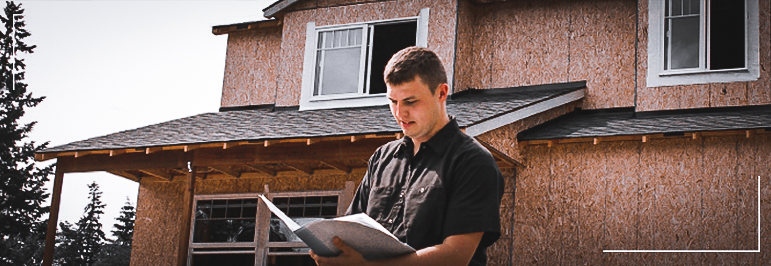Residential Home Inspection

Residential Home Inspection - Certificate
If you’d like a fast-track option to setting up your own professional home inspection business—or a career with a home inspection company—then you should consider this course.
Washington State requires all home inspectors in the state to be licensed. BTC’s Fundamentals of Home Inspection course was the first to receive approval from the Department of Licensing. This intensive, full-time course combines classroom instruction with hands-on lab and inspection work.
Home inspectors examine and report on a home’s systems and structure—from the roof to the substructure crawl space, basement or slab foundation. Typically, inspectors set up their own inspection business and work for real-estate purchasers or are hired by home inspection companies or firms specializing in architectural, engineering, and related services.
If you enjoy the challenge of working with homes of all ages, sizes, and conditions, this is the program for you!
Entry Information
When Can I Start?
The Residential Home Inspection program is offered several times during the year. The program consists of two core courses: RHI 111 and RHI 112. For schedule information, please visit the Continuing Education Class Search page on BTC’s website and search by Title: Residential Home Inspection. This program is offered on the BTC campus. For questions, contact the Continuing Education department at cce@btc.edu or 360.752.8472.
A Bellingham Technical College Admission Application is required before a student can register for the Residential Home Inspection certificate classes.
What are the Minimum Entry Requirements?
- A personal laptop that is Windows compatible with Wi-Fi and Word processing capability is required for participants.
- It is recommended that students have good basic academic skills.
- For field training (RHI 112), students must have flashlight(s), protective coveralls and basic respirators or face masks.
Program Application/Forms
Students may enroll in this part-time program’s classes without taking a placement exam, but prior to enrolling, students must complete a College Admission form. Keyboard, typing and computer skills are necessary to complete program requirements.
Physical Requirements
Anyone interested in becoming a home inspector should be aware that it is a very “physical” job that requires some amount of dexterity and strength, as well as a willingness/ability to get in tight spaces such as crawl spaces and attics, within industry standards. Traversing roofs is expected of home inspectors when it is safe to do so and this sometimes requires moving cumbersome ladders around the home. Home inspectors must be able and willing to work in all kinds of weather conditions and be prepared to do so.
What are My Next Steps?
Classes
Total Program Credits: 15
Program Outcomes
The goal of this program is to prepare entry-level home inspectors who are able to pass the state licensing exam and successfully work in the field of residential home inspection. Adhering to the core curriculum for residential home inspection, the student will gain expertise in the theory and application of professional methods of performing building inspections.
- RHI 111: Students will be able to describe the systems and components found in homes and be prepared to carry out non invasive home inspections per WA State laws at residential properties while employing special training and education.
- RHI 112: Students will complete five thorough home inspection reports that meets state standards.
Employment Outlook
The average annual wage in this field is $75,067, with an earning potential of about $88,982 per year.*
Home inspectors examine and report on a home’s systems and structure—from the roof to the basement. Typically, inspectors work for real-estate purchasers and related service companies.
The majority of home inspectors are self employed and work on behalf of potential real estate purchasers.
Faculty & Support

Donald Hester
Residential Home Instruction
Charles Buell
Residential Home InspectionContacts
If you have questions about this program or want help with the admissions steps to Bellingham Technical College, please email outreach@btc.edu.
Current students wanting academic planning and support, can connect with the program Instructor(s) or email IndustrialTradesNav@btc.edu
